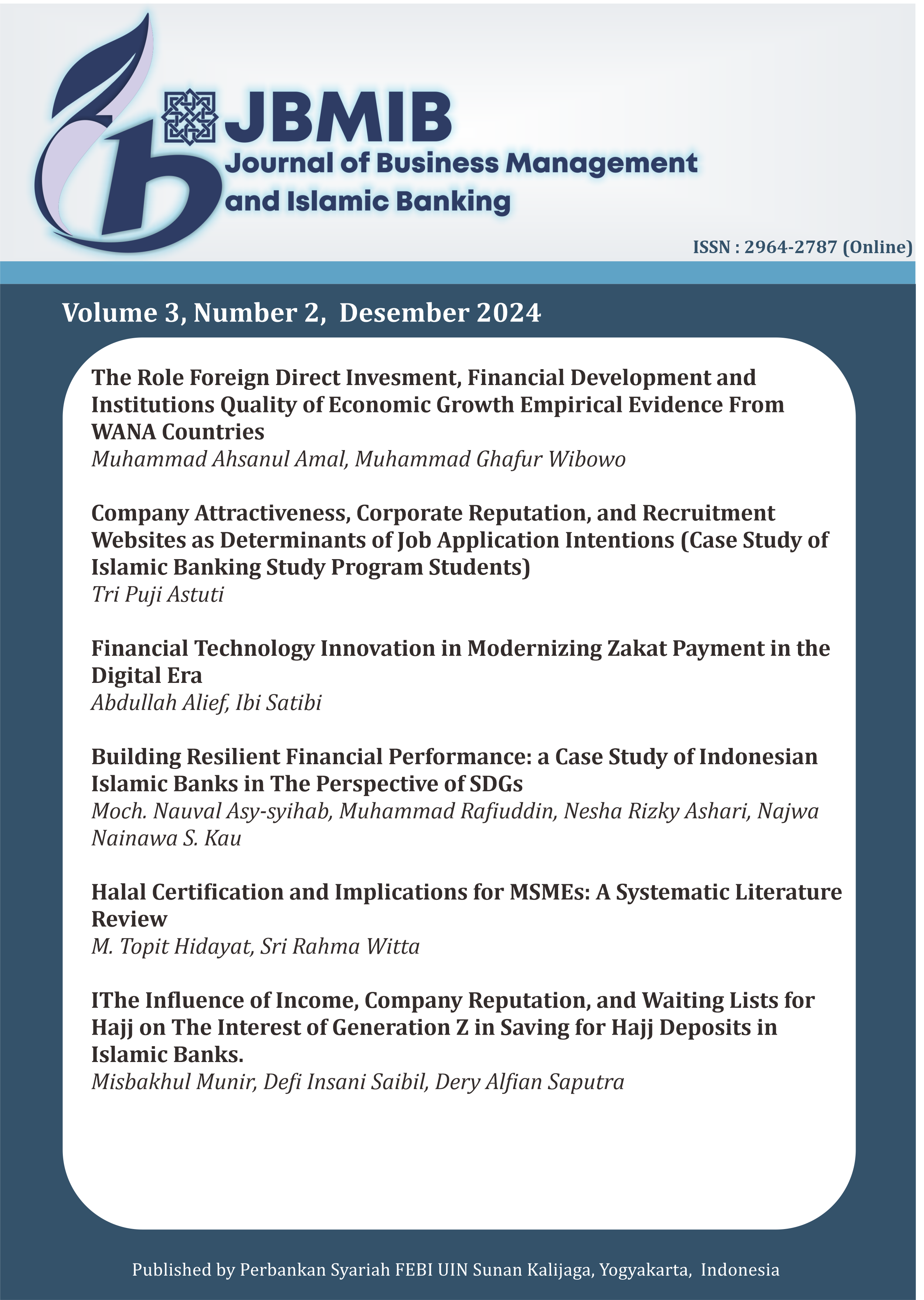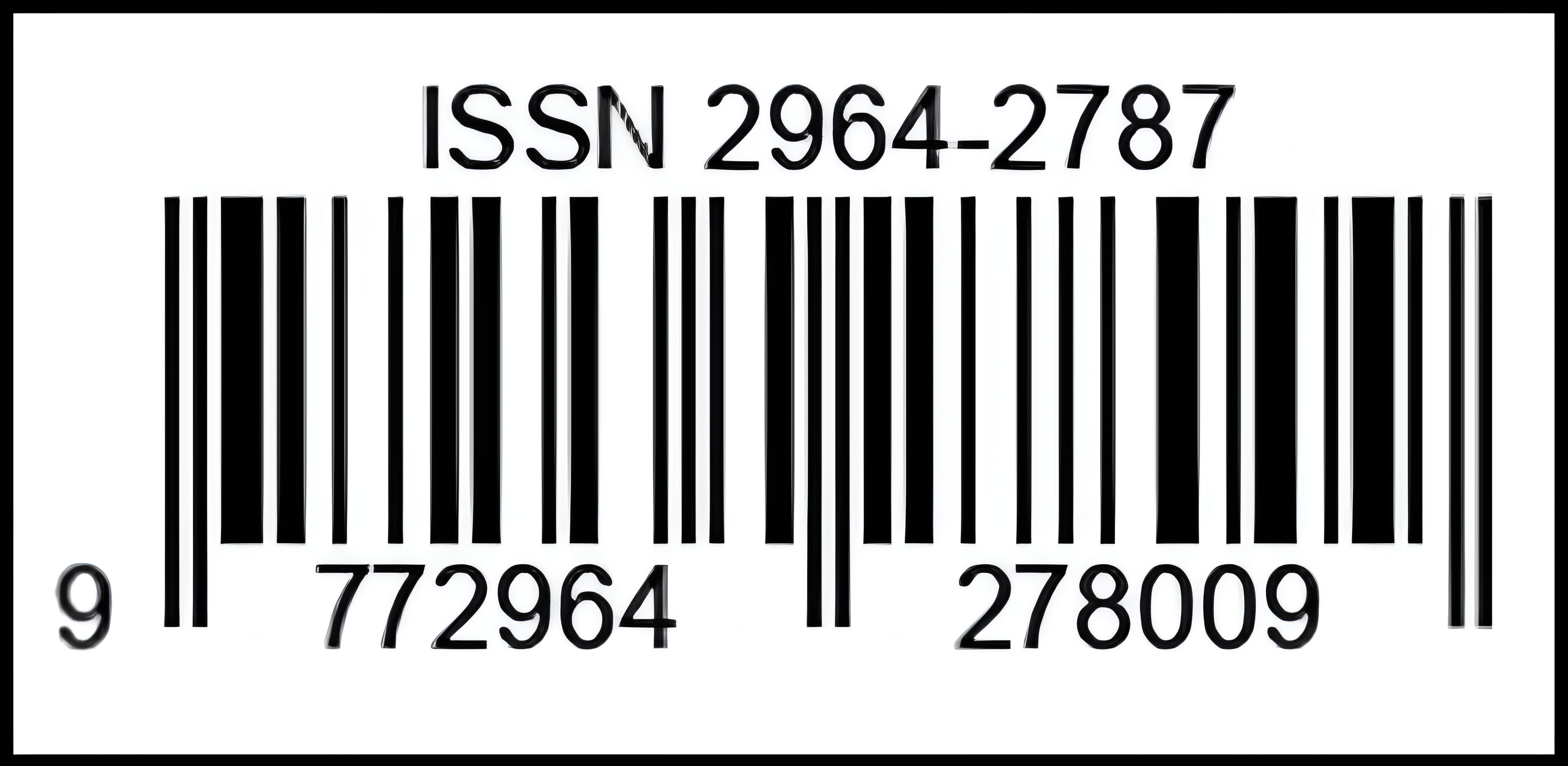Halal Certification and Implications for MSMEs: A Systematic Literature Review
DOI:
https://doi.org/10.14421/jbmib.v3i1.2373Keywords:
Halal Certification, Implications, MSMEs, Sharia EconomicAbstract
Research Aims: This study explores the role of halal certification in fostering business growth within the Micro, Small, and Medium Enterprises (MSMEs) sector. Addressing a gap in the literature on the impact of halal certification on MSME performance, it examines its influence on competitiveness, profitability, and market expansion.
Methodology: The research employs a Systematic Literature Review (SLR) methodology, gathering relevant articles published between 2019 to 2024 from the Google Scholar database. The PRISMA (Preferred Reporting Items for Systematic Reviews and Meta-Analyses) model is utilized to guide the collected studies’ identification, selection, and filtration processes.
Research Findings: The findings indicate that halal certification significantly supports MSME operations and enhances product continuity. Consumers are more likely to purchase halal-certified MSME products, positively impacting revenue and sales growth. However, price remains a dominant factor in consumer purchasing decisions, even though halal certification is crucial for meeting Muslim consumer standards.
Theoretical Contribution: This study contributes to the literature by shifting the focus from large corporations to MSMEs. It emphasizes halal certification’s economic and operational implications, highlighting its role in attracting Muslim consumers, enhancing market confidence, and fostering MSME growth and sustainability in the global halal market.
Research Limitation and Implication: The research is limited to Google Scholar studies within a specific timeframe, possibly excluding relevant findings from other sources. It emphasizes the importance of integrating halal certification into MSME strategies to meet sharia standards, enhance market performance, and provide valuable insights for policymakers and halal industry practitioners.
References
Akbar, G. R., & Rohman, I. K. (2023). Analysis of the Impact of Halal Certificate on the Performance of Micro and Small Enterprises (SMEs) with the Propensity Score Matching (PSM) Method. Journal of Strategic and Global Studies, 6(1). https://doi.org/10.7454/jsgs.v6i1.1108
Arifin, R. (2020). Legal Analysis of Halal Product Guarantee for Development of Small and Medium Enterprises (SMEs) Business in Indonesia. Jurnal Hukum Islam, 18(1), 121–136. https://doi.org/10.28918/jhi.v18i1.2693
Aslikhah, A., Djamaluddin, B., & Mugiyati, M. (2024). Halal Certification Perspective of Small Micro-Entrepreneurs in Pasuruan Regency. International Journal of Engineering Business and Social Science, 2(04), 1120–1140. https://doi.org/10.58451/ijebss.v2i04.147
Azis, R., Juanda, A. T., & Nurhayati, N. (2023). The Impact of The Halal Label on The Welfare of Micro Small-Medium Businesses in Indonesia. Journal of Halal Science, Industry, and Business, 1(1), 59–70. https://doi.org/10.31098/jhasib.v1i1.1321
Aziz, Y. A., Vui, C. N., Yuhanis, A. A., & Chok, N. V. (2012). The role of Halal Awareness and Halal Certification in influencing non-Muslims’ purchase intention. In Proceedings of the 3rd International Conference on Business and Economic Research (3rd ICBER 2012), March.
Barney, J. B. (2000). Firm resources and sustained competitive advantage. Advances in Strategic Management, 17. https://doi.org/10.1016/S0742-3322(00)17018-4
Bonne, K., & Verbeke, W. (2008). Religious values informing halal meat production and the control and delivery of halal credence quality. Agriculture and Human Values, 25(1). https://doi.org/10.1007/s10460-007-9076-y
Darmawati, Hardiana, D., Mainata, D., & Nuryadin, M. B. (2023). Halal Industry: A Literature Bibliometric Analysis on Halal Studies. In Mazahib Jurnal Pemikiran Hukum Islam (Vol. 22, Issue 1). https://doi.org/10.21093/mj.v22i1.5477
Djakasaputra, A., Juliana, Aditi, B., Fachrurazi, & Mas’ad, M. A. (2023). The Influence of Halal Certification, Halal Awareness, and Brand Image on Interest in Buying Halal Food Products: An Empirical Study of Consumers in Indonesia. International Journal of Islamic Business and Economics (IJIBEC), 7(2), 103–115. https://doi.org/10.28918/ijibec.v7i2.2003
Djunaidi, M., Oktavia, C. B. A., Fitriadi, R., & Setiawan, E. (2021). Perception and Consumer Behavior of Halal Product Toward Purchase Decision in Indonesia. Jurnal Teknik Industri, 22(2), 171–184. https://doi.org/10.22219/jtiumm.vol22.no2.171-184
Fitri, R., Sudarmiatin, S., & Zonna Lia, D. A. (2023). Urgency of Halal Certification on the Performance of MSMEs. Journal of Economics, Finance and Management Studies, 06(10), 4775–4782. https://doi.org/10.47191/jefms/v6-i10-12
Giyanti, I., & Indriastiningsih, E. (2019). Impact of Halal Certification on The Performance of Food Small Medium Enterprises. Jurnal Ilmiah Teknik Industri, 18(2), 116–123. https://doi.org/10.23917/jiti.v18i2.7242
Heryudanta, M., Apriliani, A. W., Fawaid, K., & (2023). Urgency Of Halal Certification In Msme Products. Jurnal Pengabdian, 3(10), 481–488. https://doi.org/10.59247/jppmi.v3i10.219
Hidayati, N., & Sunaryo, H. (2021). The Role of Halal Label to Increase the Effect of Attitude Toward Halal Product on Brand Image and Purchase Intention. IJEBD (International Journal of Entrepreneurship and Business Development), 4(5), 744–752. https://doi.org/10.29138/ijebd.v4i5.1496
Ismail, M., & Kornitasari, Y. (2022). Socialization of Halal Certification to Develop MSEs: Case Study in Jabung, Malang Regency. Journal of Interdisciplinary Socio-Economic and Community Study, 2(2), 86–92. https://doi.org/10.21776/jiscos.02.02.04
Izzah, H. N., & Irfany, M. I. (2024). Factors that Influence the Offender’s Decision MSME’s Have a Halal Certificate in the District Bogor. Halal Studies and Society, 1(1), 33–36. https://doi.org/10.29244/hass.1.1.33-36
Jamaluddin, J., Hidayatulloh, H., Zaini, A., & Sanawi, S. (2022). The problems of implementing Halal certification through the self-declaration program for MSMEs in Indonesia: A Case Study. International Journal of Advances in Social and Economics, 4(1), 30–36. https://doi.org/10.33122/ijase.v4i1.221
Jannah, S. M., & Al-Banna, H. (2021). Halal Awareness and Halal Traceability: Muslim Consumers’ and Entrepreneurs’ Perspectives. Journal of Islamic Monetary Economics and Finance, 7(2), 285–316. https://doi.org/10.21098/jimf.v7i2.1328
Karimah, N., & Darwanto, D. (2021). Effect of Halal Awareness, Halal Certification, Food Ingredients Composition, Halal Marketing and Religiosity on Purchase Intention of Imported Food Products. Al-Kharaj : Jurnal Ekonomi, Keuangan & Bisnis Syariah, 3(2), 177–191. https://doi.org/10.47467/alkharaj.v3i2.319
Kotler, P. and K. L. K. (2016). Marketing Manajemen. In Pearson Education.
Muhnidin, A., & Br. Pinem, R. K. (2024). The Role of Halal Certification and Brand Image in Increasing Consumer Trust (Case Study of MSMEs Crispy Masjef Bananas). Journal La Bisecoman, 5(2), 201–209. https://doi.org/10.37899/journallabisecoman.v5i2.1208
Najmudin, N., & Syihabudin, S. (2022). Religiosity and Halal Certification: Its Effect on Interest in Buying Traditional Food. Li Falah: Jurnal Studi Ekonomi Dan Bisnis Islam, 6(2), 79. https://doi.org/10.31332/lifalah.v6i2.2994
Nurillah, S. L. (2023). The Importance of Halal Certificates in Halal Food Using the Digital Platform. International Journal of Law Dynamics Review, 1(2), 99–111. https://doi.org/10.62039/ijldr.v1i2.20
Pratama, H. (2022). Stakeholders Synergy in Accelering MSME (UMKM) Halal Certification Through Halal Self-Declare. Jurnal Ilmiah Mahasiswa Raushan Fikr, 11(2), 271–287. https://doi.org/10.24090/jimrf.v11i2.6054
Pratikto, H., Agustina, Y., & Kiranawati, T. M. (2023). The Influence of Various Factors on MSME Halal Certification Behavior: An Analysis With Intention as an Intervening Variable. International Journal of Professional Business Review, 8(9), e3444. https://doi.org/10.26668/businessreview/2023.v8i9.3444
Pratiwi, A., Darmawati, & Amaliyah, R. (2020). The Impact of Awareness, Lifestyle, and Halal Certification on The Buying Interests of MSME’S Halal Food Products In DKI Jakarta. Jouranl of Islamic Economic and BUsiness, 3(2), 257–281. https://doi.org/10.21154/elbarka.v4i2.3207
Purnomo, I. A., Pratikto, H., & Suharsono, N. (2024). The Influence of Halal Certification and Halal Awareness on Purchasing Decisions. East Asian Journal of Multidisciplinary Research, 3(4), 1567–1578. https://doi.org/10.55927/eajmr.v3i4.8861
Purwanto, A., Asbari, M., Santoso, P. B., Wijayanti, L. M., Hyun, C. C., & Pramono, R. (2020). Halal Foods Purchase Intension among Indonesian Non-Muslim Consumers: An Exploratory Case Study Approach. International Journal of Science and Management Studies (IJSMS), April 2020, 15–27. https://doi.org/10.51386/25815946/ijsms-v3i2p103
Purwanto, A., & Sudargini, Y. (2022). Exploring Factors Affecting the Purchase Intention of Halal Food Products : An Empirical Study on Student Consumers. Ijosmas, 04, 21–31.
Puspita, D. A., Sudarno, S., & Junaidi, I. U. (2023). The Effect of Halal and Price Labels on MSME Culinary Products: An Experimental Study of the Purchase Decision of the Pandahalungan Community. Journal of Economics, Finance and Management Studies, 06(06), 2551–2557. https://doi.org/10.47191/jefms/v6-i6-15
Rezai, G., Mohamed, Z., & Shamsudin, M. N. (2012). Non-Muslim consumers’ understanding of Halal principles in Malaysia. Journal of Islamic Marketing, 3(1). https://doi.org/10.1108/17590831211206572
Sahir, S. H., Fahlevi, M., Kasbuntoro, & Sutia, S. (2021). Effect of halal food management system certification on buying interest of Indonesian consumer goods. Uncertain Supply Chain Management, 9(3), 731–738. https://doi.org/10.5267/j.uscm.2021.4.005
Septiani, D., & Ridlwan, A. A. (2020). The Effects of Halal Certification and Halal Awareness on Purchase Intention of Halal Food Products in Indonesia. Indonesian Journal of Halal Research, 2(2), 55–60. https://doi.org/10.15575/ijhar.v2i2.6657
Sosianika, A., & Amalia, F. A. (2020). Uncovering Indonesian Millennial’s Halal Food Purchase Intention: Halal Value and Halal Logo as the Antecedents. International Journal of Applied Business Research, 2(01), 31–45. https://doi.org/10.35313/ijabr.v2i01.91
Sudarmiatin, S., Khoirul Anam, F., & Wafaretta, V. (2020). The Intention of Halal Certification by Micro Business. KnE Social Sciences, 2020, 141–155. https://doi.org/10.18502/kss.v4i9.7322
Sujono, R. I., Wiyandi, W., Wibowo, F. W., Yunadi, A., Kamal, A. H., Wibowo, A., & Salam, A. (2023). Purchase Decision on Halal Products among Female Muslim: Evidence from Indonesia. Shirkah: Journal of Economics and Business, 8(3), 309–321. https://doi.org/10.22515/shirkah.v8i3.555
Supriyadi, S., Aulia, R., Nubahai, L., Rahman, R. A., & Mohamed, R. (2024). Legal Effectiveness of Halal Product Certification in Improving Business Economics in Indonesia and Malaysia. Al-Ahkam, 34(1), 193–220. https://doi.org/10.21580/ahkam.2024.34.1.20546
Susilawati, C., Joharudin, A., Abduh, M., & Sonjaya, A. (2023). The Influence of Religiosity and Halal Labeling on Purchase Intention of Non-Food Halal Products. Indonesian Journal of Halal Research, 5(2), 77–89. https://doi.org/10.15575/ijhar.v5i2.22965
Umami, M., Nada, S., & Anisa, N. L. (2023). Implementation halal product certification through self-declare program for MSEs products in Cirebon Regency. Journal of Community Service and Empowerment, 4(2), 300–307. https://doi.org/10.22219/jcse.v4i2.25058
Downloads
Published
Issue
Section
License
Copyright (c) 2024 Journal of Business Management and Islamic Banking

This work is licensed under a Creative Commons Attribution-ShareAlike 4.0 International License.












